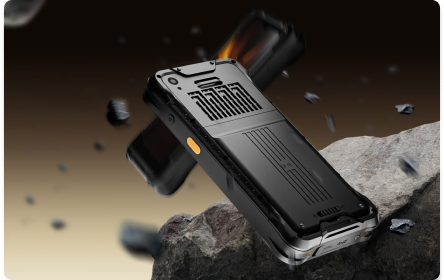
¿Qué es un PC industrial?
Un PC industrial (IPC) es un ordenador diseñado y construido para aplicaciones industriales. A diferencia de las computadoras de consumo, los IPC están diseñados para operar de manera confiable en ambientes hostiles donde hay temperaturas extremas, vibración, polvo y humedad. Se utilizan en fábricas, almacenes y otros entornos industriales para controlar procesos de fabricación, monitorear equipos y automatizar operaciones.
Las PC industriales vienen en diferentes formas, como sistemas montados en rack, montados en panel o integrados. Se pueden personalizar para adaptarse a requisitos específicos y pueden ejecutar diferentes sistemas operativos, como Windows, Linux o sistemas operativos en tiempo real (RTOS). Los IPC generalmente tienen un tiempo medio entre fallas (MTBF) más alto en comparación con las computadoras de grado de consumo y pueden operar 24/7 durante años.
PC industrial rugosa Puede equiparse con varias interfaces de entrada/salida (E/S), como puertos serie, Ethernet, USB y E/S digitales y analógicas para conectarse a sensores, actuadores y otros equipos. También se pueden configurar con hardware especializado, como tarjetas de adquisición de datos, matrices de puertas programables en campo (FPGA) o controladores lógicos programables (PLC) para realizar tareas específicas.
En general, los PC industriales son esenciales para muchas aplicaciones industriales, donde la confiabilidad, la durabilidad y la personalización son cruciales.
¿Que es un PLC?
PLC significa Controlador Lógico Programable. Es un tipo de sistema de control industrial que se utiliza para automatizar y controlar diversos procesos industriales. Los PLC se usan típicamente en plantas de fabricación, fábricas y otros entornos industriales para controlar maquinaria y equipos.
Un PLC es esencialmente una computadora especializada que está diseñada para controlar procesos industriales. Consiste en un procesador, memoria, módulos de entrada/salida (E/S) y una interfaz de programación. La interfaz de programación permite a los ingenieros y técnicos crear programas personalizados que dictan cómo el PLC controlará varios procesos industriales.
Los PLC son capaces de controlar una amplia gama de procesos industriales, desde simples operaciones de encendido/apagado hasta procesos más complejos como el control de movimiento y la adquisición de datos. Son dispositivos confiables y robustos que están diseñados para operar en entornos industriales hostiles. Los PLC se han convertido en una parte esencial de la automatización industrial moderna y son ampliamente utilizados en diversas industrias en todo el mundo.
Diferencia entre PC industrial vs PLC
Las PC industriales (IPC) y los controladores lógicos programables (PLC) se utilizan en sistemas de automatización y control industrial, pero existen algunas diferencias clave entre ellos.
Un IPC es una computadora diseñada para soportar entornos industriales hostiles y realizar funciones de procesamiento y control de datos. Por lo general, ejecuta un sistema operativo de propósito general, como Windows o Linux, y puede admitir una amplia variedad de aplicaciones de software. Los IPC se pueden usar para una variedad de tareas, incluyendo adquisición de datos, visualización, control y monitoreo.
Por otro lado, un PLC es un dispositivo especializado diseñado específicamente para aplicaciones de control industrial. Es un dispositivo electrónico robusto y programable que se utiliza para controlar maquinaria y procesos en fábricas y otros entornos industriales. Los PLC están diseñados para ser altamente confiables y soportar condiciones extremas, como temperatura, humedad y vibración. Se programan utilizYo un lenguaje de programación especializado y se usan típicamente para tareas como monitorear sensores, controlar motores y válvulas y ejecutar funciones lógicas.
Una de las diferencias clave entre los IPC y los PLC es su lenguaje de programación. Los IPC suelen utilizar lenguajes de programación de alto nivel como C , Java o Python, mientras que los PLC utilizan lógica de escalera especializada o diagramas de bloques de función. Los PLC también están diseñados para ser deterministas, lo que significa que pueden ejecutar comYos con tiempos precisos, lo cual es crítico para muchas aplicaciones de control industrial.
Otra diferencia es su arquitectura de hardware. Los IPC generalmente usan componentes de computadora estándar, como procesadores, memoria y almacenamiento, mientras que los PLC usan módulos de entrada/salida digitales y analógicos especializados para interactuar con sensores y actuadores. Este diseño modular permite que los PLC se puedan personalizar y ampliar fácilmente para satisfacer las necesidades de una amplia variedad de aplicaciones industriales.
En general, si bien los IPC y los PLC se utilizan en la automatización y el control industrial, tienen diferentes fortalezas y debilidades. Los IPC son más flexibles y pueden admitir una gama más amplia de aplicaciones, mientras que los PLC están diseñados específicamente para el control industrial y son altamente confiables y deterministas.
Mejore sus operaciones industriales con EmdoorEs de vanguardia PC industrial del panel de Android Y PC industrial de Windows. Nuestros dispositivos confiables y duraderos están diseñados para optimizar la eficiencia y la productividad en entornos exigentes. Integre a la perfección estos PC de panel industrial de alto rendimiento en su flujo de trabajo y disfrute de funciones avanzadas como construcción robusta, interfaces de pantalla táctil y potencia de procesamiento robusta. Maximice su potencial de negocio con las PC industriales del panel de Emdoor, la solución perfecta para la automatización industrial, la gestión de datos, y los sistemas de control. Experimente una conectividad perfecta y un rendimiento mejorado para sus aplicaciones industriales con las PC de panel industrial de Android y Windows de Emdoor.









